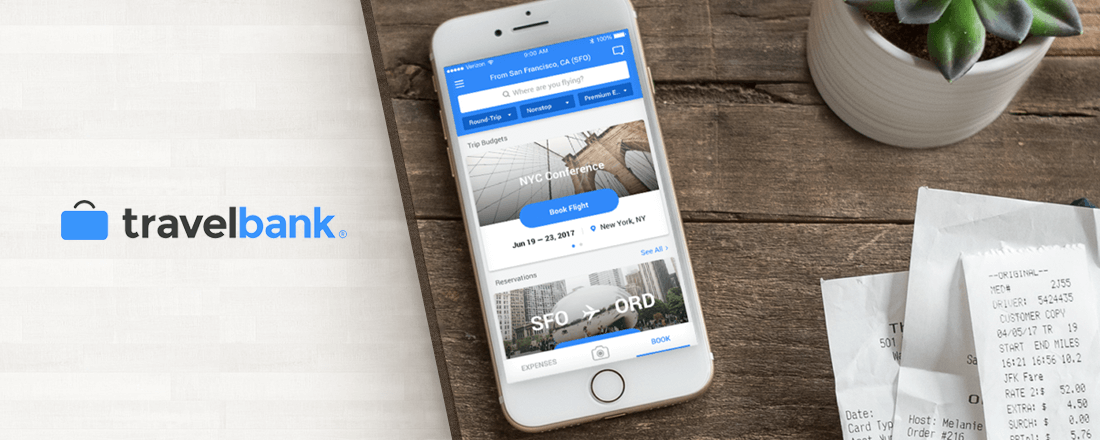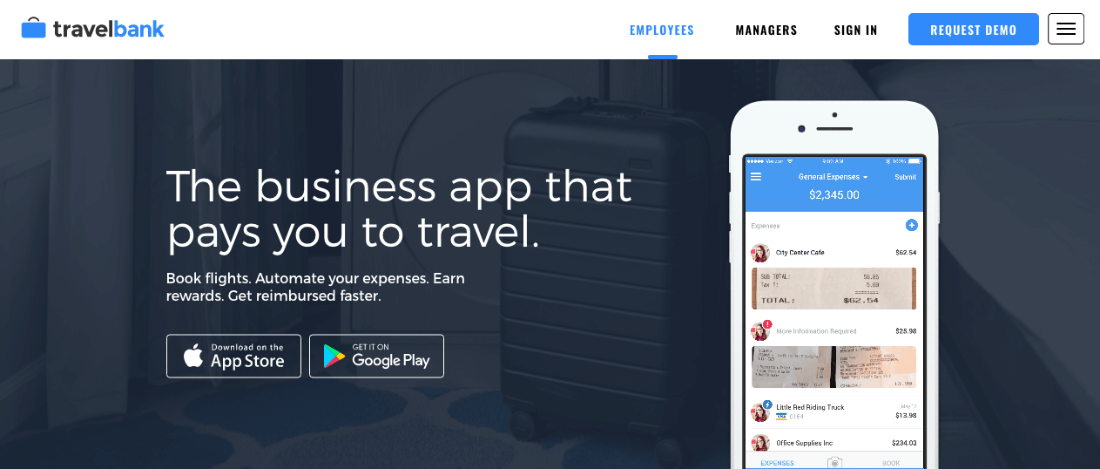
Companies worldwide spent a whopping $1.3 trillion on business travel last year, according to the Global Business Travel Association (GBTA), and the organization predicts travel spent on flights, hotels, car rentals, meals and other business-related travel essentials will only continue to increase—reaching $1.6 trillion by 2020.
TravelBank, a budgeting, expense and booking app for business travel, aims to change that. Designed with small- and mid-sized companies in mind, the app encourages employees to travel frugally—while earning rewards for their efforts—and enables employers to tap into cashback rebates on total spend.

Leveling—and Modernizing—the Playing Field
“It’s a win-win across the board,” said Duke Chung, TravelBank’s co-founder and CEO, who was inspired to create the app after Microsoft acquired his last company, Parature, in 2014.
Along with co-founders Reid Williams and Ching-Ho Fung, Chung learned first-hand that the business expense and booking platforms available on the market at the time were cumbersome, old-fashioned, and carried a price-point most small- and mid-sized companies could not afford.
They also discovered that large companies—like Microsoft—were at a significant advantage when booking business travel because of their size and the traffic they could generate. Smaller companies couldn’t access the discounted rates the larger ones could. And because they were relying on employees to book their own business travel, these smaller organizations had no choice but to pay retail rates.
“We also saw that even large companies were unable to anticipate travel expenses before they happened,” Chung added. “Technology that could predict the cost structure before a trip was something everyone wanted but had never been done before. All of these factors were behind the inspiration to create TravelBank.”
The small- and mid-sized business community has responded enthusiastically. Since its launch in late 2016, more than 700 companies in more than a dozen industries have downloaded the free app and processed more than $2 million in business-travel expenses.

Spend Less and Earn Rewards
Getting started with TravelBank is as simple as downloading the free app (available from the AppStore or Google Play). While anyone can use the software to predict travel costs, create expense reports and book airline tickets, you’ll only receive rewards for coming in under budget if your employer chooses to use TravelBank as its company-wide travel and expense solution.
“Once a company signs on—which is completely free—they can work with their employees on a travel budget,” Chung explained. “We use AI and machine learning combined to predict, using live market rates and the company’s travel policies, an average cost for the upcoming trip including airfare, hotel, rental car and food.”
“Once your employer approves the budget for your trip, you can spend the money any way you like,” Chung continued. “If you want to spend more on your flight and less on your hotel, you can. If you want to stay at a really cool hotel, and take a cheaper flight, you can. You can mix and match your experience. No one had done that before, but you can now do it through our app.”
The app couples this flexibility with an incentive for employees to actually spend less than their trip budget: TravelBank points.
“Let’s say you’re going from San Francisco to New York for one week,” Chug said, “and the approved TravelBank budget for that trip is $2,500. You end up spending only $2,000 because you made a conscious decision to spend responsibly and help your employer save money. They can now give you half of those savings back. In this example, you saved the company $500 and would get a $250 bonus as a result in the form of TravelBank points.”
Employees can spend TravelBank points on anything in the app’s rewards store including Uber, Lyft and Airbnb.
“We have users who are earning thousands of dollars in TravelBank points just by beating their budgets,” Chug said. “They’re becoming super-thrifty and economical. We’ve had some users here in San Francisco who have told us that they haven’t had to pay for personal Ubers for months. And that’s just because they helped their companies save money.”
In addition to employees who spend company money as responsibly as they do their own—reducing travel costs by 30 percent or more—employers can earn cashback rebates when they book all of their business travel through TravelBank.
“We’re the first platform that’s not only free to use for as many employees as you want, but gives you up to 1 percent back just for booking through us,” Chung concluded.
To learn more about TravelBank’s many features and benefits—including real-time expense report creation, social seating, concierge tagging and 24/7 support—visit the website at travelbank.com.
